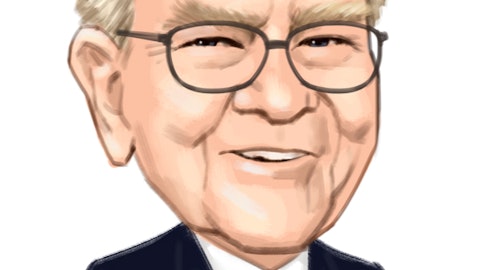2. Citigroup Inc. (NYSE:C)
Number of Hedge Fund Holders: 79
PE Ratio: 7.15
Citigroup Inc. (NYSE:C) is a New York-based investment banking and financial services company that offers its services in over 160 countries and jurisdictions.
On November 22, Bloomberg reported that Citigroup Inc. (NYSE:C) is considering a new direct-lending strategy to solidify its position in the expanding private credit market worth $1.6 trillion. The strategy is estimated to start by early January and would be an addition to the corporation’s syndicated leverage finance operations.
On November 2, Bloomberg reported that Citigroup Inc. (NYSE:C) was chosen, along with The Goldman Sachs Group, Inc. (NYSE:GS), to lead the initial public offering (IPO) of Ibotta, a digital marketing software firm. The listing is estimated to be valued at $2 billion and is expected to happen sometime in the next year.
Silver Beech Capital mentioned Citigroup Inc. (NYSE:C) in its third quarter 2023 investor letter. Here is what it said:
“Citigroup (“Citi”) is a large-capitalization global diversified financial services holding company that primarily serves multinational institutional and high net worth consumer clients. Citi is one of three large American banks to be designated in “bucket 3 or 4” of the “global systemically important bank” (“G-SIB”) framework by The Basel Committee on Banking Supervision. The other banks in this group are J.P. Morgan and Bank of America.
As a G-SIB, Citi is subjected to increased regulatory supervision by global bank regulators and central banks. Enhanced regulatory supervision was an important post-crisis reform to strengthen the global financial system by increasing bank capital ratios, transparency, and decreasing risk-taking. These reforms resulted in the largest G-SIBs moving away from risk-oriented banking activities such as advisory, high-yield lending, and trading, towards lower-risk activities. Indeed, Citi’s most valuable, high-growth segment, Treasury and Trade Solutions, is in lower-risk and entrenched activities such as liquidity and cash management, payments, trade solutions, and automated receivables processing. In our view, somewhat unintuitively, Citi’s increased regulatory supervision contributes to the company’s less risky banking business model, and thus its attractiveness as a downside-oriented investment opportunity.
Citi’s market perception suffers from the bank’s negative historical reputation. In 2008 during the Great Financial Crisis, Citi received the most TARP funding (the largest “bailout”) of the U.S. banks. TARP funding was provided by the U.S. government to forestall a liquidity problem that threatened to become a solvency problem. More recently, Citi mistakenly used its own capital to pay lenders when acting as Revlon’s loan agent, resulting in a $400M fine by the Federal Reserve and orders to resolve internal controls (which Citi fulfilled). Citi’s large global consumer bank was assembled by prior management in the early 2000s to attract and service high-end global consumers. Unfortunately, this pivot was costly and ill-timed in the context of increasingly complex multi-jurisdictional regulation to prevent money laundering and tax evasion. The global consumer bank has been a drag on Citi’s overall performance.
We believe the market dislikes Citi for these historical reasons and because Citi earns lower returns on equity (“ROE”) than its peers. In 2023, Citi has so far earned an ROE of ~7%, compared with peers that earn 10%+ ROEs. Recognizing that Citi is less valuable than its peers because it is a lower performance bank, we would argue that Citi’s valuation is still far too low. We believe the market is over-discounting Citi at its current valuation of ~0.48x tangible book value (“TBV”)…” (Click here to see the full text)
Receive real-time insider trading and news alertsFollow Citigroup Inc (NYSE:C)
Follow Citigroup Inc (NYSE:C)





